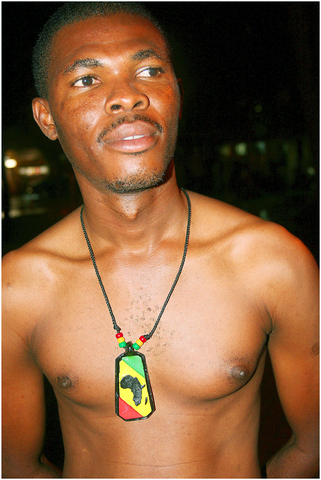Your favorite group of African musicians not only has a new sound but is branching out into fashion this week.
The Pan Africana Cultural Troupe has been performing in Taiwan for the past four years and has built up a steady following with its frequent gigs and occasional TV appearances.
Led by the enterprising Ben Stobite Sampson and the musically challenging Rankin' Kim Douglas the ever-evolving group has a more Caribbean lilt these days.

PHOTO: JULES QUARTLY, TAIPEI TIMES
A steel drum, xylophone and trumpet have been added to the base sound of African drums and the result is a tighter and more melodic sound that will attract new fans.
Outside the band's studio in Shida, Taipei, Sampson reaches into his suitcase and pulls out some men's shirts and women's dresses, all in brilliant colors and patterned with animal prints.
A leather bag made of bush goat is deep brown and has white leather stitching and innovative tooling. Sandal uppers are fashioned from goat hide and the soles are made from car tires.
There are also dried-wood African pendants, bracelets constructed out of colored electrical wire and big round nteh seeds formed into necklaces.
Sampson has just started importing textiles and jewelry from Takoradi in his native Ghana and plans to expand his business to China and other Asian nations.
“I want to open up the market to African goods,” Sampson said.
“Europeans and Americans know about these things but here people are still learning.”
Pan Africana will be showcasing its new sound and putting on a fashion show this tomorrow, at Sappho, starting at 10pm. The lounge bar is located at B1, 1, Ln 102, Anhe Rd, Sec 1, Taipei (台北市安和路1巷1號B1). Entrance is NT$200.
For more information visit www.panafricana.blogspot.com.

The 2018 nine-in-one local elections were a wild ride that no one saw coming. Entering that year, the Chinese Nationalist Party (KMT) was demoralized and in disarray — and fearing an existential crisis. By the end of the year, the party was riding high and swept most of the country in a landslide, including toppling the Democratic Progressive Party (DPP) in their Kaohsiung stronghold. Could something like that happen again on the DPP side in this year’s nine-in-one elections? The short answer is not exactly; the conditions were very specific. However, it does illustrate how swiftly every assumption early in an

Towering high above Taiwan’s capital city at 508 meters, Taipei 101 dominates the skyline. The earthquake-proof skyscraper of steel and glass has captured the imagination of professional rock climber Alex Honnold for more than a decade. Tomorrow morning, he will climb it in his signature free solo style — without ropes or protective equipment. And Netflix will broadcast it — live. The event’s announcement has drawn both excitement and trepidation, as well as some concerns over the ethical implications of attempting such a high-risk endeavor on live broadcast. Many have questioned Honnold’s desire to continues his free-solo climbs now that he’s a

Francis William White, an Englishman who late in the 1860s served as Commissioner of the Imperial Customs Service in Tainan, published the tale of a jaunt he took one winter in 1868: A visit to the interior of south Formosa (1870). White’s journey took him into the mountains, where he mused on the difficult terrain and the ease with which his little group could be ambushed in the crags and dense vegetation. At one point he stays at the house of a local near a stream on the border of indigenous territory: “Their matchlocks, which were kept in excellent order,

Jan. 19 to Jan. 25 In 1933, an all-star team of musicians and lyricists began shaping a new sound. The person who brought them together was Chen Chun-yu (陳君玉), head of Columbia Records’ arts department. Tasked with creating Taiwanese “pop music,” they released hit after hit that year, with Chen contributing lyrics to several of the songs himself. Many figures from that group, including composer Teng Yu-hsien (鄧雨賢), vocalist Chun-chun (純純, Sun-sun in Taiwanese) and lyricist Lee Lin-chiu (李臨秋) remain well-known today, particularly for the famous classic Longing for the Spring Breeze (望春風). Chen, however, is not a name